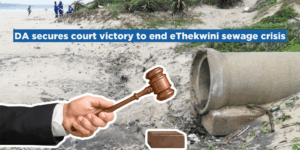- Companies chosen to implement the NSFAS direct payment system are young and inexperienced. Many experienced banks reportedly applied for the bid but were unsuccessful.
- The DA will supplement the existing Public Protector complaint around the involvement of Andile Nongogo in the tender awarding process, the lack of financial licenses among selected companies, and the imposition of exorbitant fees on students.
- The DA seeks transparency and clarity to ascertain if there were any irregularities in awarding the contract and ensure public funds are used responsibly for education.
On 10 July, Stellenbosch SRC Vice Chairperson and DASO member, William Sezoe, lodged a complaint with the Public Protector regarding the National Student Financial Aid Scheme’s (NSFAS) direct payment system. The DA will today submit a supplementary complaint with the Public Protector to reinforce the original one and to ensure urgent attention to the matter.
While the DA welcomes the idea of a direct payment system as a “secure and student-centred approach” the way that NSFAS has chosen to implement this, is highly worrisome. An investigation by the Organisation Undoing Tax Abuse (Outa) has found that all the service providers for this project – Coinvest Africa, Tenet Technology, Ezaga Holdings and Norraco Corporation — are young and unexperienced companies. On the other hand, it also appears that many experienced banks have applied for the bid but has failed.
The concerns raised by William Sezoe in his complaint revolve around several critical issues:
- The involvement of Andile Nongogo in the tender awarding process, considering his relationship with the directors of Coinvest, raises legitimate doubts about the fairness and impartiality of the selection procedure;
- The decision to award tenders to companies lacking financial licenses warrants clarification from NSFAS, as this poses serious doubts about their ability to handle students’ funds responsibly; and
- The justifiability of appointing companies charging exorbitant fees to students requires scrutiny, as it affects public funds, especially those allocated for education.
The DA urgently needs this information, as requested, to determine if there were any irregularities involved in the award of this contract?
The absence of essential financial licenses among the selected companies raises alarming concerns about their competence in managing students’ funds prudently. Additionally, the imposition of exorbitant charges on financially vulnerable students diverts much-needed funds away from education and into the hands of private entities.
It is imperative that public funds, particularly those allocated for education, be utilised transparently and efficiently. The future of our nation depends on the education and aspirations of our youth, and any misuse of education funds betrays their dreams.
Therefore, NSFAS must provide clear explanations on the implementation of the “direct payment” system and the criteria employed in selecting service providers. Students have the right to know that their education funds are being managed ethically and responsibly.




